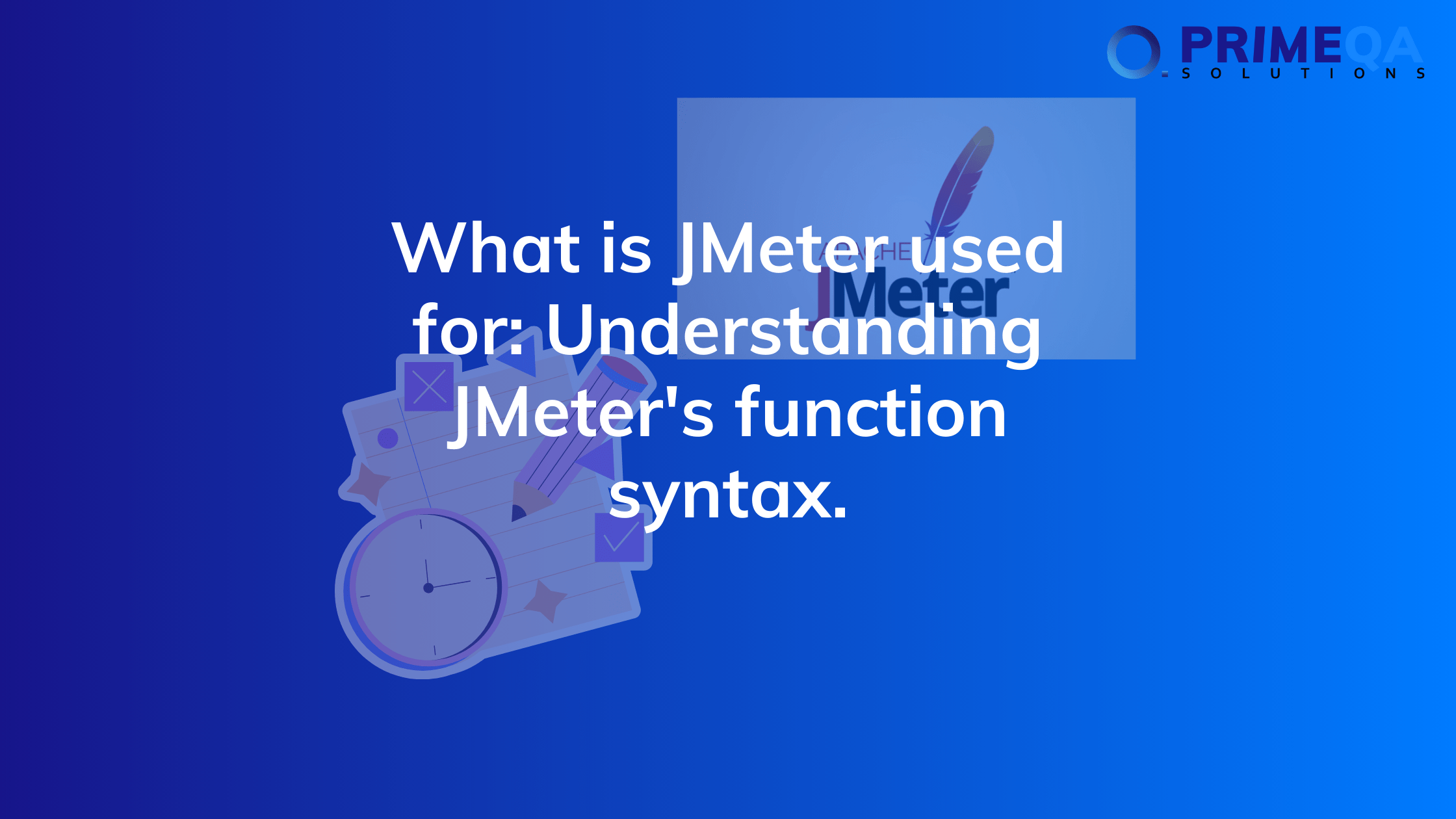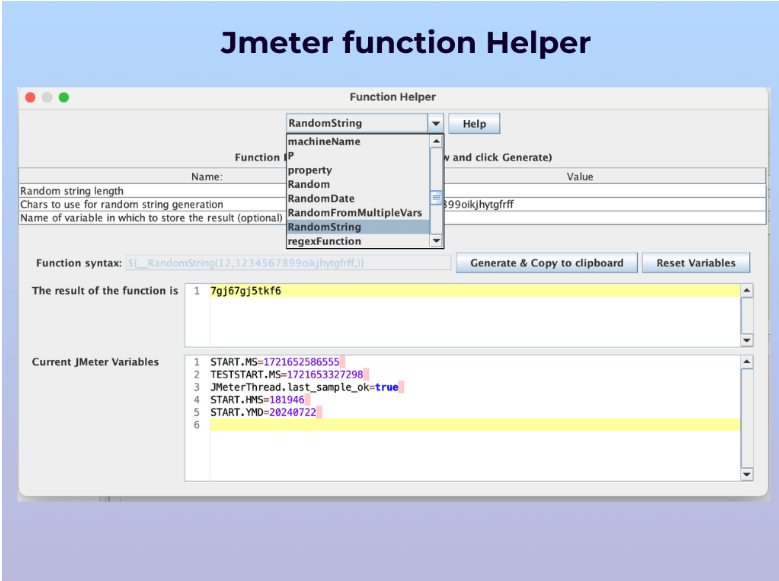Apache JMeter is a versatile tool in performance testing as it helps to enhance the performance of the software. JMeter is a free and open-source software tool for running performance tests on web applications, servers, and other services. In this blog post, we will see what JMeter is used for, and go through the JMeter’s function syntax so you can harness the most out of this amazing tool.
What is JMeter’s Function Syntax used for?
JMeter usage includes several types of testing to ensure the reliability and performance of your applications:
Performance tests:
The most common use of JMeter is, of course, for performance testing web applications. Many people use the program simultaneously, so it helps you see how your application can hold its breath in stress. This is meant to be some kind of measurement of response time, throughput, and finding bottlenecks.
Load Testing:
JMeter’s function syntax load testing on the performance of a system under normal and peak load conditions. It thus helps make sure that, with the help of JMeter’s function syntax, your application can handle expected volumes of users without any loss of performance by way of creating realistic load conditions.
Stress Testing:
Stress testing tests the limits of your application; it will increase the load until failure. With the help of stress testing identifies your application’s capacity and ensures that it can gracefully recover from extreme conditions of load which is another key feature of jmeter’s function syntax.
Functional Testing:
JMeter is helpful not only for performance testing but also for functional testing of online applications. JMeter can validate the functionality of the application by developing test plans that mimic the interaction of users.
Distributed Testing:
JMeter allows for distributed testing. The load can be shared among several workstations to run big tests. It is really convenient when testing applications with hundreds of concurrent users.
Understanding JMeter’s Function Syntax
JMeter functions are special values that generate dynamic data during the test execution process. They bring more flexibility to your test strategies by making it possible to parameterize requests and validate responses. The following are the most frequent functions and their syntax.
Function Helper Dialog: The JMeter function helper dialog is a tool that assists you in creating and understanding JMeter functions. It provides a user-friendly interface to select and configure functions.
Common JMeter”s Function Syntax:
- __time(): Returns the current time in various formats.
- __Random(): Generates a random number within a specified range.
- __UUID(): Generates a universally unique identifier.
Main Goals of Using Functions: The main goals of using functions in JMeter include:
- Parameterization: Allowing dynamic data to be used in requests.
- Validation: Checking responses against expected values.
- Flexibility: Enhancing test scripts with variable data.
1. __time__
The __time() function returns the current time in milliseconds. It’s useful in creating timestamps.
Syntax:
${__time()}
2. Random.
The __Random function returns a random number in a defined range. This is useful when you want to test variable data.
Syntax:
${__Random(min, max, seed)}
min : Minimum value, inclusive.
max: The highest value (inclusive).
Seed: An optional seed for the random number generator.
3. __UUID
The __UUID function returns a UUID, or universally unique identifier. This is commonly used to create some sort of unique value for each request.
Syntax:
${__UUID()}
4. __String From File
The __StringFromFile function retrieves a string from a file. This means you can load test data from an external source.
${__StringFromFile(filename, random)}
‘filename’: The path to the file.
‘random’: Whether to read lines randomly (true/false).
5. _counter
The __counter function creates an incremental counter. This can be useful to generate sequences.
Syntax:
${__counter(start, increment)}
‘start’: The starting value.
‘increment’: The value by which to increment the counter.
Example: Functions in Use in a JMeter Test Plan.
Now, let’s take an example of a JMeter test plan using these functions. Let’s say we want to test a website’s login function with different usernames and timestamps.
Thread Group: Here, we set up the ramp-up time and the number of users.
Send an HTTP request: As an example, we add the request to call the login endpoint.
Use Functions in Parameters:
Username: ${__UUID()}
Timestamp: ${__time()}
Example Request Parameters
{ “username”: “${__UUID()}”,
“timestamp”: “${__time()}”}
test data will be dynamic and realistic since each request will contain a different username and a current date due to the usage of Jmeter’s function syntax.
Conclusion
Apache JMeter is a great tool for doing load and performance testing of web applications. Knowledge of the JMeter function syntax will strongly improve your test strategies by adding dynamism and flexibility. JMeter routines are necessary for generating random numbers, timestamps, or unique identifiers for realistic and efficient test scenarios.
For comprehensive JMeter usage and expertise on performance testing, functional testing, and distributed testing in JMeter, connect with PrimeQA Solutions. Our team provides professional guidance on how to install JMeter plugins and leverage JMeter plugins for optimal testing performance. Visit our Contact Us page to learn more and get started!
FAQs
What is Apache JMeter used for?
Answer: Apache JMeter is used for performance testing, load testing, and functional testing of web applications, servers, and services. It helps measure response times, and throughput, and identify bottlenecks under different load conditions.
How does Apache JMeter perform load testing?
Answer: Apache JMeter load testing involves simulating multiple users accessing a service simultaneously to observe how it handles high traffic. It measures performance metrics such as response time, latency, and throughput under various load conditions.
How to do performance testing of APIs with Jmeter?
Answer: Yes, JMeter performance testing can be applied to APIs. JMeter supports various protocols including HTTP, HTTPS, SOAP, and REST, making it suitable for testing the performance of API endpoints.
What are JMeter functions and how are they used?
Answer: JMeter functions are special values that generate dynamic data during test execution. They are used to parameterize requests, validate responses, and enhance test scripts with variable data. Common functions include __time(), __Random(), and __UUID().
How do you conduct online JMeter load testing?
Answer: Online JMeter load testing can be conducted using cloud-based platforms that integrate with JMeter, such as BlazeMeter. These platforms allow you to run JMeter tests from multiple locations and scale up the number of virtual users without local resource constraints.
What is the role of BrowserStack Local Testing in performance testing?
Answer: BrowserStack Local Testing enables you to test web applications hosted on your local machine or behind a firewall using remote browsers on BrowserStack. This ensures comprehensive testing across different browsers and devices without exposing your application to the public internet.
How can you set up Distributed Testing with Apache JMeter?
Answer: In distributed testing, Apache JMeter allows you to share the load among multiple machines to simulate a large number of users. You can perform distributed testing with the help of multiple JMeter servers and a single JMeter client to manage the test execution.
What is JMeter’s Function Syntax?
Answer: The syntax for JMeter functions involves using function names followed by parentheses containing parameters. For example, __time(yyyy-MM-dd) returns the current date in the specified format. The JMeter function helper dialog assists in constructing these functions.
How to use JMeter for functional testing of web applications?
Answer: It is possible to use Jmeter for functional testing by creating test plans that mimic user interactions with the web application, verifying the correctness of responses, and ensuring the application’s functionality meets the requirements.
What are the benefits of using Apache JMeter for load testing?
Answer: Apache JMeter load testing provides several benefits, including identifying performance bottlenecks, ensuring scalability, validating system stability under peak loads, and generating detailed reports on performance metrics.
How can you integrate Jmeter with the CI/CD pipeline?
Answer: You can integrate CI/CD pipelines with Jmeter by using tools like Jenkins. This allows for automated performance and load testing as part of the build process, ensuring that any code changes do not degrade performance.
What are some popular JMeter plugins and how do you install them?
Answer: Popular JMeter plugins include the JSON Plugin, JDBC Plugin, and Throughput Shaping Timer. To install them, use the JMeter Plugins Manager available in the JMeter interface or download the plugins from the JMeter Plugins website and place them in the JMeter lib/ext directory.
Can JMeter test web applications hosted in the cloud?
Answer: Yes, Apache JMeter can test web applications hosted in the cloud. You can deploy JMeter in a cloud environment and simulate user traffic from different geographic locations to test the application’s performance under various network conditions.
What are the main goals of using functions in JMeter?
Answer: The main goals of using functions in JMeter are to provide dynamic input values, enhance the flexibility of test scripts, enable parameterization, and support complex testing scenarios by generating random or sequential data during test execution.
How can you use JMeter online for performance testing?
Answer: To use JMeter online for performance testing, you can utilize cloud-based services that offer JMeter as a service, such as BlazeMeter or RedLine13. These platforms allow you to run JMeter tests from the cloud, providing scalability and ease of use.








